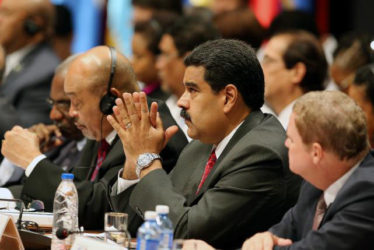HAVANA (Reuters) – Venezuelan Presi-dent Nicolas Maduro called upon Latin America yesterday not to give in to “brutal pressure” from the United States to isolate his government, which is battling intensifying opposition at home and abroad.
The head of the Organization of American States (OAS), that Venezuela views as a pawn of US policy, this week called for an emergency meeting to discuss a possible censure of the country for violating democratic norms.
Meanwhile on Thursday a senior Brazilian official said Brazil may help block Venezuela from taking the rotating presidency of the Mercosur trade group this month, in a bid to prevent Maduro from strengthening his power.
“I call upon the governments of the continent to maintain solidarity, cooperation and understanding and not to submit to … brutal pressure to isolate Venezuela,” Maduro entreated other Caribbean leaders gathered for a summit in Havana.

As Venezuela falls deeper into an economic crisis that includes food and medicine shortages, spiraling inflation and sporadic looting, opposition protests for a recall referendum against Maduro are also growing.
Maduro has denounced this as part of an undercover US-backed coup against his socialist government.
“Venezuela will not give in, it will not kneel down, we will fight with the same force we have fought against coups and any type of interventionism these last 17 years,” he said.
In the speech opening the summit, Cuban President Raul Castro gave Maduro his “robust and unconditional support” and denounced the “imperialist counteroffensive” against progressive governments throughout Latin America.
A generation of leftist leaders took power in the region around 2000, leveraging a boom in commodity exports to pursue ambitious and transformative social policies.
Venezuela also used its oil to wield influence abroad. A majority of the 25 states that are members of the Association of Caribbean States, or ACS, receive subsidized Venezuelan fuel.
But commodity prices have plunged in recent years and support for these leftist governments has crumbled.
Argentina’s Peronists lost the presidency in elections last November after 12 years in power, while the 13-year rule of the Workers Party in Brasil ended dramatically with the suspension of President Dilma Rousseff in May.
Castro, who was part of the revolutionary group that overthrew a US-backed dictator in Cuba in 1959, expressed his support for Rousseff who was facing a “parliamentary coup promoted by the oligarchic and neoliberal right-wing”.
He also underscored that Cuba would never return to the OAS, which it deemed “an instrument of imperialist domination”.





